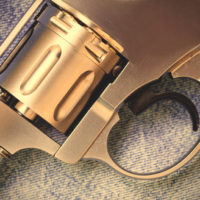Regulated Firearm Laws in Maryland

Today’s blog entry will explore the boundaries of regulated firearm laws in Maryland. The first section will define the term regulated firearm.
What is the Definition of a Regulated Firearm in Maryland?
Under Maryland Public Safety Code section 5–101, the term regulated firearm includes:
- Handguns; and
- Assault Weapons.
Concerning assault weapons, specifically, Section 5-101 provides a detailed listing of 45 firearms that qualify. The list is extensive, including many carbines, automatic rifles, assault shotguns and similar weapons or copies.
Moving past regulated firearms, generally, the next section will define the term handgun.
What is the Definition of a Handgun in Maryland?
As defined in Section 5-101 and Maryland Criminal Code section 4-201, the term handgun:
- Refers to all firearms with barrels shorter than 16 inches that can be carried in a concealed manner;
- Includes signal pistols, starter pistols, blank pistols, short-barreled shotguns and short-barreled rifles; and
- Excludes regular shotguns and rifles as well as antique firearms.
Switching gears from handguns, the next section will define the term antique firearm.
What is the Definition of an Antique Firearm in Maryland?
As defined in Section 4-201, the term antique firearm refers to:
- Firearms manufactured before 1899, including matchlock, flintlock, percussion cap and similar ignition systems;
- Replicas of firearms manufactured before 1899;
- Firearms without the capability to use rimfire or conventional centerfire fixed ammunition; or
- Firearms designed for ammunition that is not manufactured in the United States or commercially available in regular channels of trade.
Changing focus from antique firearms, the next section will explore the requirements for regulated firearms.
Requirements for Regulated Firearms in Maryland
Under Maryland Public Safety Code section 5–117, there is an application requirement for the purchase, rental or transfer of a regulated firearm. The new owner or renter must complete and submit a firearm application before taking possession.
Additionally, there is a waiting period requirement under Maryland Public Safety Code section 5–128. No person may purchase more than one regulated firearm within a 30-day period. That being said, the waiting period requirement does not apply to:
- Law enforcement agencies;
- State or local correctional facilities;
- Private security companies holding the proper licenses;
- Purchases of antique firearms;
- Firearm dealers holding the proper licenses;
- Exchanges of regulated firearms within 30 days of valid purchase; or
- Replacement of lost or stolen firearms under certain conditions.
Having covered ownership and purchase requirements, the next section will address the penalties for violating regulated firearm laws.
Penalties for Violating Regulated Firearm Laws in Maryland
The penalties for violating the regulated firearm laws appear in Section 5-128. Specifically, a violation of these laws constitutes a misdemeanor crime. The potential penalties include 36 months in prison and $5,000 in fines.
Do You Need Legal Help?
If you are facing charges or gun crimes or other criminal offenses, it can be highly advantageous to contact a trustworthy criminal defense attorney. The attorneys at Schlaich & Thompson, Chartered in Bel Air, Maryland, have more than 55 years of combined legal experience in criminal defense, including gun crimes. If you need legal help, contact us today for an initial consultation.
Resource:
mgaleg.maryland.gov/webmga/frmStatutesText.aspx?article=gps§ion=5-101&ext=html&session=2017RS&tab=subject5
